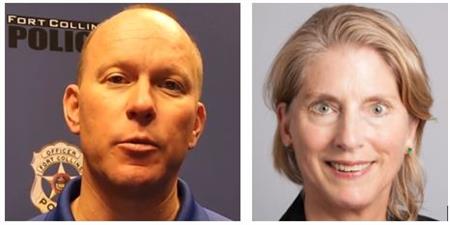
Perrie reported that the Ft Collins RJ program started 21 years ago and successfully functions with only two staff and more than 50 volunteers. Part of the RJ mission is to divert young offenders from the justice and court system. This has required a paradigm shift from traditional concepts of criminal justice (laws broken, details of crime and what does the offender deserve?) to restorative justice (what harm, to whom, how can the harm be repaired and who should do the repairs). As we look through the “restorative lens” we add the victim and the community to the (traditional) focus on the offender.
In Ft Collins there are various programs depending on the offense. The RESTORE Program deals with shoplifting theft offenses. The RJCP and Reflect Programs make victim concerns central and allow for several options for the victim. The RJ process takes about 30 hours for a young person to complete and includes intake/resource referrals, preparation meetings, the RJCP conference, an RJ accountability contract and a completion meeting. The RESTORE sessions include a community impact panel, a facilitated small group discussion, contract development, merchant participation and a completion meeting.
The RJ “circle” includes 2 trained volunteer facilitators, the offender and his/her support (eg, parents), the victim and their support, a community representative and peer representatives (often young people who have successfully completed the program). A question was asked-How does the RJ program get referrals? Sources include officers, Municipal Court, and (especially) the District Attorneys office.
Cpl Jarad Sargent presented the second half, starting with an explanation of the SRO program. Nationally, in the School Resource Officer Program an officer has 3 roles-Teacher, Counselor and Law Enforcement Officer. According to Sargent, the SRO program has not collected and reported information to the public about their roles as teachers, counselors and mentors in the school and only reported on law enforcement activities. This led to a misunderstanding about what SROs do. SROs are now collecting information on all the work they do and will be making information on the full range of their services available to the public. The program began in Ft Collins in 1995 and functions through a contract between the FCPS and PSD.
The SRO has several options for offender referral, ranging from counseling and mentoring, referral to a diversion program to detention. The SRO will try to evaluate the student’s assets and needs, connect them with counselors and help them complete RJ program. Often this leads to long term, valuable relationships for students (and I suspect officers as well). SROs can make direct referrals to the RJ program, thereby avoiding the court and legal system completely.
How does the officer decide on what charges and resolution is appropriate? The victim always has the final say. The resolution varies from the school handling the offense all the way to detention for the more severe (eg, repeat offenders, weapons charges, etc).
The last slide illustrated some of the changes made in our recent “unusual” year (2020). These include efforts to collect data more consistently, significant revisions to SOPs (standard operating procedures) and a review of mission guidelines. A graph of national data on juvenile offenses demonstrated a significant decline in arrest and detention of juveniles due to officers utilizing community resources, such as Restorative Justice, to address the criminal activity.
Very telling was the hesitation on the part of Perrie when asked by Harry Mueller-”What do you do with dropouts from the program?” It sounds like the number is very low. If the youth is struggling to complete, RJ staff and volunteers take the time to find out why. Are more resources needed? More time? What are the obstacles? RJ staff and volunteers work with the youth to overcome the obstacles. If that is unsuccessful, the youth will be sent back to the referring agency, where a decision will be made on how to move forward from there. RJ staff and volunteers just keep trying because they know for most youth the program works.